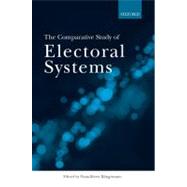
Note: Supplemental materials are not guaranteed with Rental or Used book purchases.
Purchase Benefits
What is included with this book?
| Preface | p. xi |
| About the Contributors | p. xiv |
| List of Figures | p. xvi |
| List of Tables | p. xviii |
| Introduction | |
| The Impact of Political Institutions: A Contribution of the "Comparative Study of Electoral Systems" (CSES) to Micro-Macro Theories of Political Attitude Formation and Voting Behavior | p. 3 |
| The Project | |
| "Big Social Science" in Comparative Politics: The History of the Comparative Study of Electoral Systems | p. 31 |
| Methodological Challenges: Research Opportunities and Questions for the Future | p. 50 |
| Electoral Participation | |
| Socioeconomic Status and Nonvoting: A Cross-National Comparative Analysis | p. 85 |
| Electoral Systems, Efficacy, and Voter Turnout | p. 109 |
| Political Parties, Candidates, and Issues | |
| Multiple Party Identifications | p. 137 |
| Candidate Recognition in Different Electoral Systems | p. 158 |
| Who Represents Us Best? One Member or Many? | p. 171 |
| Economic Voting: Do Institutions Affect the Way Voters Evaluate Incumbents? | p. 193 |
| The Ease of Ideological Voting: Voter Sophistication and Party System Complexity | p. 220 |
| How Voters Cope with the Complexity of Their Political Environment: Differentiation of Political Supply, Effectiveness of Electoral Institutions, and the Calculus of Voting | p. 237 |
| Expressive and Instrumental Voting | |
| Expressive Versus Instrumental Motivation of Turnout, Partisanship, and Political Learning | p. 269 |
| District Magnitude and the Comparative Study of Strategic Voting | p. 289 |
| Political Support | |
| Institutional Variation and Political Support: An Analysis of CSES Data from 29 Countries | p. 311 |
| Effectiveness and Political Support in Old and New Democracies | p. 333 |
| Final Report of the 1995-6 Planning Committee | p. 347 |
| The Micro-Level Questionnaire of Module 1 | p. 380 |
| The Macro-Level Questionnaire of Module 1 | p. 387 |
| References | p. 398 |
| Index | p. 419 |
| Table of Contents provided by Ingram. All Rights Reserved. |
The New copy of this book will include any supplemental materials advertised. Please check the title of the book to determine if it should include any access cards, study guides, lab manuals, CDs, etc.
The Used, Rental and eBook copies of this book are not guaranteed to include any supplemental materials. Typically, only the book itself is included. This is true even if the title states it includes any access cards, study guides, lab manuals, CDs, etc.